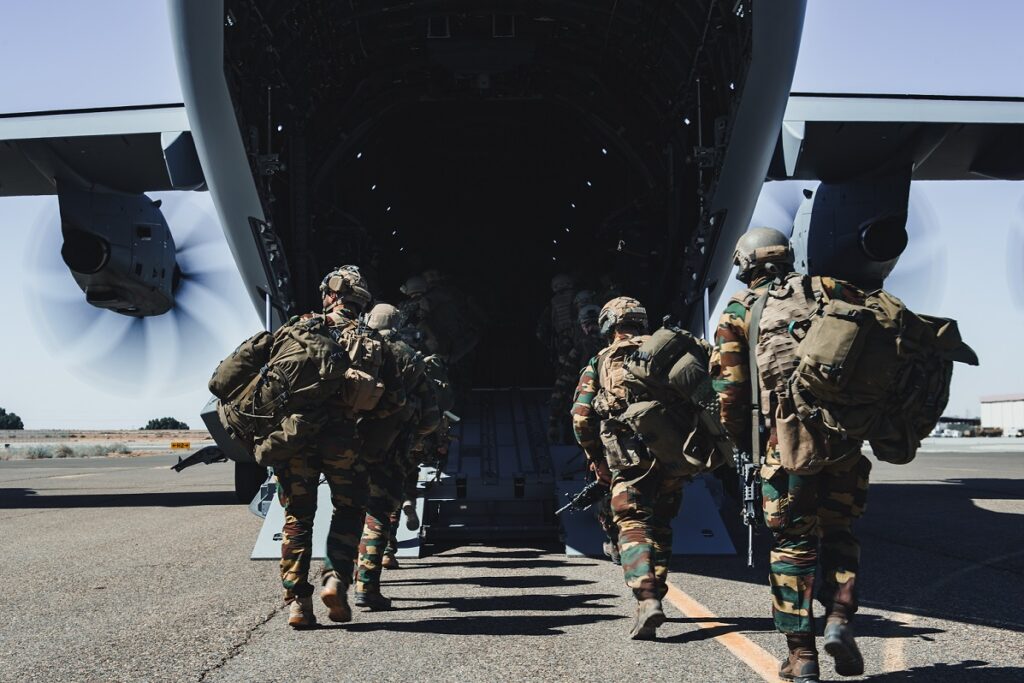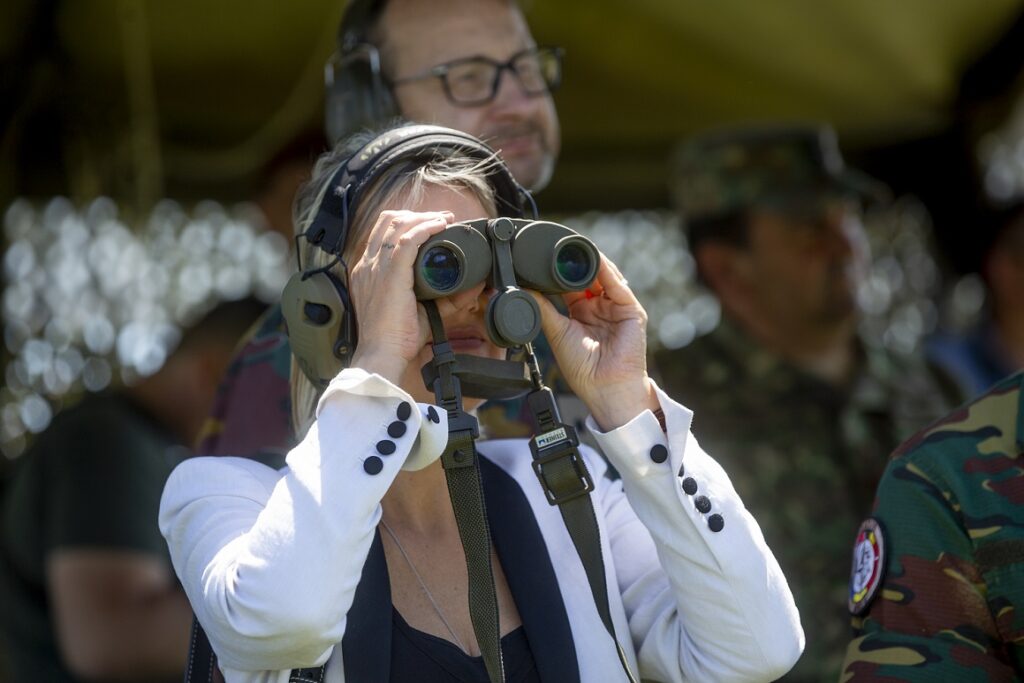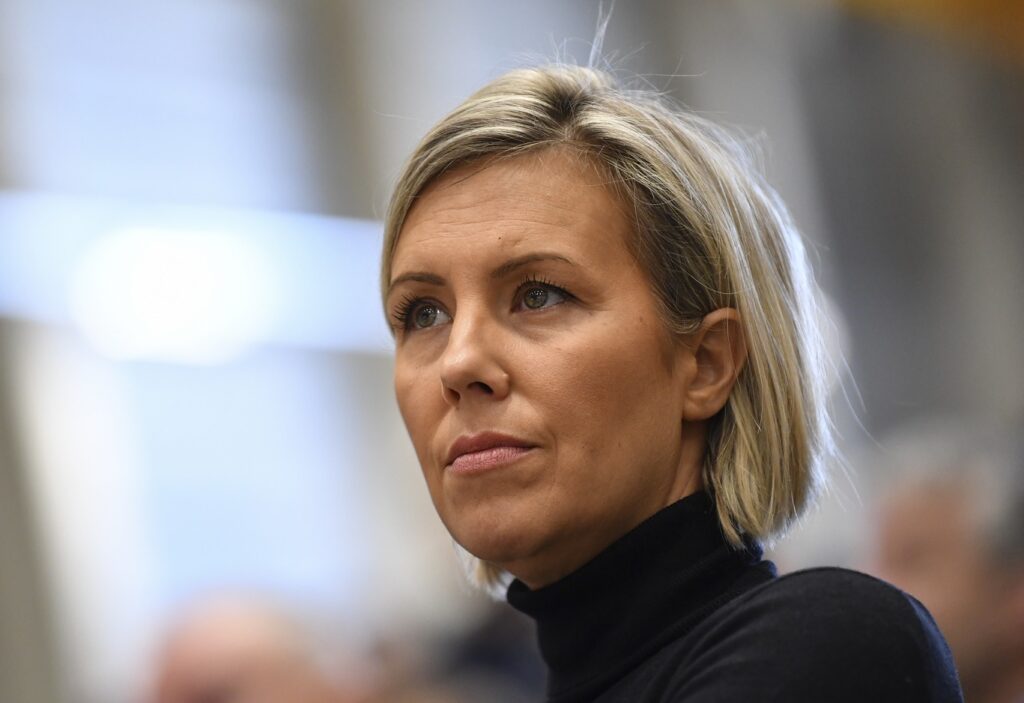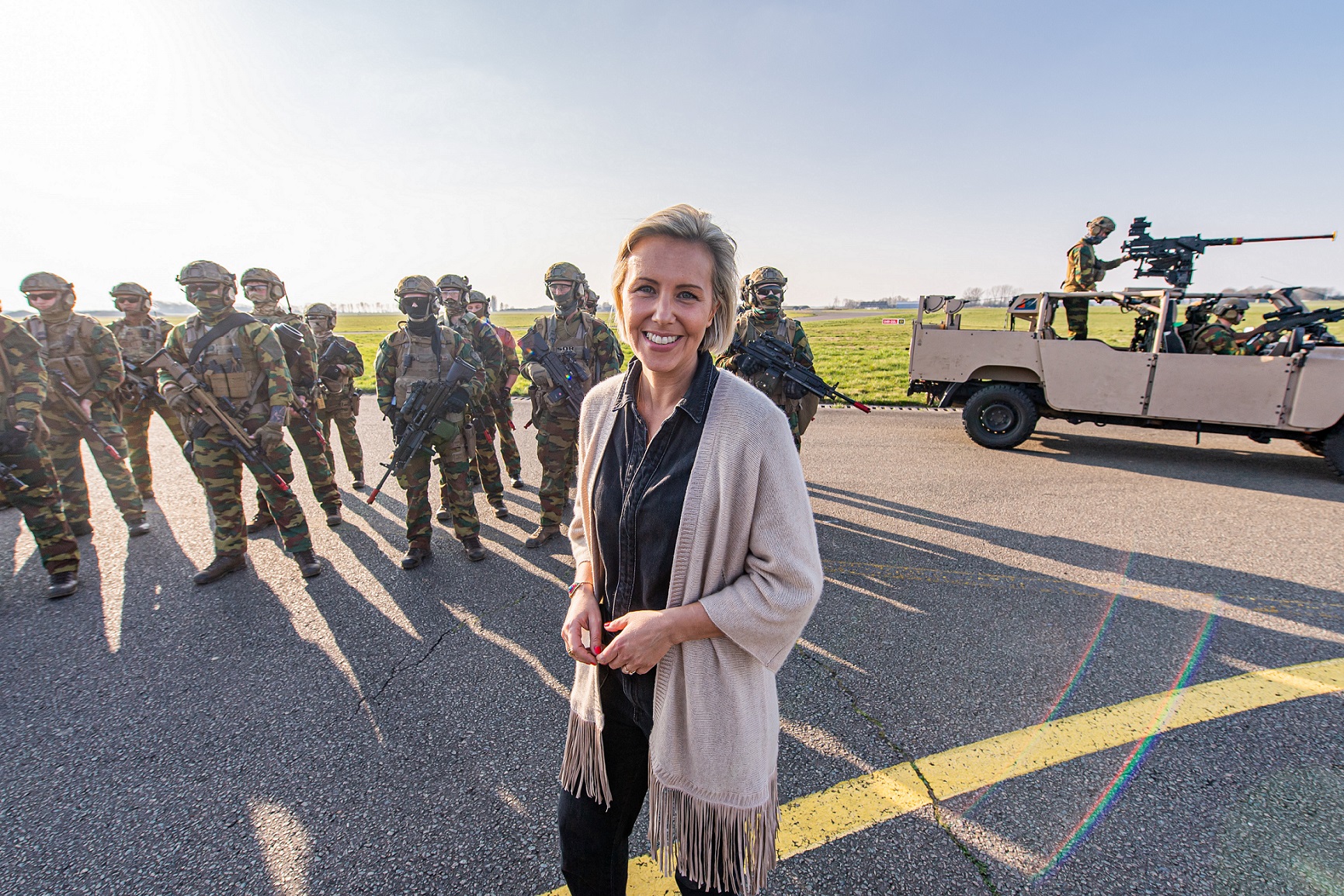Ludivine Dedonder is used to being called ‘The General’ at home and, given her job as Belgium’s Defence Minister, it seems appropriate. And she insists she is up to the job at hand, whether being a mother or a minister. “Life has taught me that people who work hard and believe in themselves can achieve anything they want,” she says. “My parents taught me to study and work hard, and it has paid off.”
Dedonder’s current tenure at the Defence Ministry comes at a critical time, as the conflict in Ukraine has brought war back to Europe, even raising the spectre of nuclear war.
As a former TV anchor who has followed a well-trodden path in Belgium of journalists moving into politics, Dedonder has swapped a TV ratings war for the real thing. Top of her to-do list is ensuring Belgium rebuilds its defence.
But chatting over coffee at Brussels’ grand Egmont Palace, a neoclassical pile which, today houses the Belgian defence ministry, she is relaxed about the challenge. “One does not have to be in the military to be a good Defence Minister,” she says. “I have a view from outside the defence world, so I bring a new approach which can help me to see things from other perspectives. It helps to get things moving and get things done.”
Appointed by Belgian Prime Minister Alexander De Croo a year ago, her responsibilities include issues not normally associated with the military, such as floods and health pandemics.
But her main task is to turn Belgium’s armed forces around following decades of budgetary cuts. After Russia invaded Ukraine, most European countries began reinforcing their militaries, including Belgium, which announced €1 billion in extra defence spending. And, like its allies, Belgium sent arms and ammunition to Ukraine.
Though long in the making already, the spending hike was announced the day after the Ukraine war started, and was dubbed the STAR Plan, for Security, Technology, Ambition and Resilience, a massive hike in government investment to boost the defence budget to 1.54 percent of GDP by 2030 and two percent by 2035.
However, this comes from a low base: until a few years ago, the Belgian defence budget barely reached one percent of GDP, half of NATO’s two percent target.
When pressed on this, Dedonder blames her predecessors. “The previous government had not done that,” she says, before emphasising that. “We’ve turned that page and started reinvesting in our armed forces, in personnel, investments, equipment and infrastructure.”
For some, including Belgian defence expert Wannes Verstraete from Egmont, the Royal Institute for International Relations, this is a “step in the right direction” yet still “insufficient if Belgium wants to credibly contribute to collective defence.”
But Dedonder says the important thing is “not to spend more but to spend better.” The Belgian army is, she says, “widely appreciated” for its high operational output on land, sea and air. In late October, she launched a new cyber command centre, “an important step to be able to face the current hybrid threats.”
She accepts Belgium is a small country and its armed forces are not built to operate on large theatres all alone. That, she adds, is why Belgium mostly operates within European, NATO or United Nations framework operations – although its navy collaborates with the Netherlands and the army with France.
More Belgians in boots
Dedonder stresses that rebuilding Belgium’s defence starts with the actual personnel. For the first time since 1993, when conscription ended, Belgium’s armed forces will be expanded, from its current 25,000 to 29,000 by 2030 (by comparison, conscripts aside, the force counted 45,000 career soldiers in 1993).

Belgian soldiers boarding a transporter plane
The budget will grow from today’s €4.7 billion to €6.9 billion in 2030 and more than €10.4 billion in 2035 – when Belgium will reach the NATO two percent target. Even so, this needs to be done in a way to be sure Belgium’s defence has “time to evolve and grow to be able to use this money in a good and responsible way.”
Several plans are now in place, including building two new military bases and cancelling planned closures of other bases while keeping them decentralised. “People want to work more closely to their homes and to spend more time with their friends and family,” she says. “By decentralising and continuing investment in existing facilities, we will make sure we can offer workplaces at an acceptable distance from home.”
Has the Ukraine war changed how Belgium – and Europe – see defence? She considers the question carefully. “It has exposed that we could no longer wait to invest in our armed forces and that we have been surfing on the ‘peace dividend’ for too long,” she says. “It has not specifically changed the views on defence but has confirmed that we took the right decisions. Too late, some will say but the war has shown that our massive investments in cyber, intelligence and logistics were the right thing to do.”

The minister watching an army exercise in Cincu, Romania
What of the culture within the armed forces? Last year, Jürgen Conings, a Belgian soldier with extreme right-wing views, went AWOL after he stole weapons from a military base. A 46-year-old shooting instructor who had been on a watch list for suspected extremists, Conings was found dead in a wooded area near the Dutch border just weeks after making death threats against one of Belgium’s top virologists. The case raised questions about why a known far-right sympathiser - one of at least 30 soldiers who were being monitored by Belgium's threat analysis unit - had been allowed access to military weapons.
Dedonder admits that mistakes were made, but again maintains that the issue has been addressed. “The Conings case revealed several structural problems which have been resolved or are being tackled,” she says. “Our military intelligence service has been reinforced in terms of personnel and means and will continue to be reinforced in the future. Communication lines within our organisation have been reinforced, as well as the communication with other security services.”
Nor, she says, is the Belgian army riddled with right-wing extremism. “We are a representation of our society and any form of extremism had to be tackled in our society and our defence forces,” she says.
Social mobility
Born in Tournai – her partner is Tournai mayor Paul-Olivier Delannois – Dedonder studied engineering while gravitating to the Socialist Party (PS). Why the socialists? “The PS stands for solidarity, which is one of my key principles in life. We have to show solidarity to those who need it and don’t live a selfish life,” she says.
Another of Dedonder’s key principles is social mobility. “We cannot let people fall behind,” she says. “We need to offer perspective to people, to let them believe in themselves and let them grow beyond themselves. Social mobility is about giving people the opportunity to become a better version of themselves, with new chances in life and new perspectives for a better future.”
As for her own involvement in politics, she sees it as a duty. “I became a politician to get things done, to move things forward and to engage myself for the community as a whole,” she says. “I want to listen to people, to hear and help them and try to offer solutions to them by moving things forward on a political lever for the sake of the community as a whole.”
Her first job in politics was working for the notorious bon vivant politician Michal Daerden, whose penchant for a drink led him to be nicknamed the Serge Gainsbourg of Belgian politics. Dedonder defends Daerden. “He pushed his co-workers, in a good way, to be as much informed as one can be on the subjects you were working on,” she says. “We worked hard and long days together, but we had good fun as well. He was a good boss and taught me a lot. People may have their views on him from the outside, but I worked with him and I have very good memories of my time in his office.”
Woman’s world
Dedonder, whose social media combines photos of missions in the field and life anecdotes, says she gets on well with another former TV journalist-turned-politician, former anchor Hadja Lahbib, who is now Belgium’s Foreign Minister.
Some suggest she was appointed to give the Defence Ministry a more modern and feminine image. Just 11 percent of Belgium’s armed personnel are women, and she is one of just five other EU countries with female defence ministers – and that is barely more than in 2014 when there were four (including, in Germany, current European Commission President Ursula von der Leyen).

Dedonder at the inauguration ceremony of a new production hall in Lummen for the horizontal tailplane of the F-35 fighter aircraft
Does being a woman make a difference? She replies with a gentle scold. “I have to say this kind of question only comes from a male journalist,” she says. “Gender does not make a difference. My fellow ministers are all in their posts through what we have already achieved and what we can achieve and not because of who we are. Of course, I am proud of this but for me, it is a normal thing. It feels weird to have to explain how happy I am to be the first female minister of defence in Belgium.”
Nonetheless, gender equality clearly animates her. “I’m here because of my determination, who I am as a person and politician, not because I am a woman,” she adds. “And if I can inspire young women and girls to achieve their dreams, I’m happy to do so.”
Looking ahead, she sees the role of the Defence Ministry in the broadest of terms. The armed forces, she says, should be able to deploy abroad in military operations and Belgium when there is a national emergency. “But defence forces can never be first-line responders in case of emergency and need to be kept as a strategic reserve,” she says. “By investing in more dual-use capacities, our armed forces will be better equipped to intervene on the national territory in case of a national security crisis.”
Perhaps of equal interest to most Belgians are her thoughts, as a former football journalist and her family’s football traditions (her grandfather played for Tournai in the First Division), on Belgium’s chances in the upcoming World Cup. “It is our last chance to bring home the World Cup with one of the best generations that Belgian football has ever known,” she says, adding that still likes to watch her 12-year-old son Oscar play on Sunday mornings and play football with him in the garden.
What about her future? Could she follow von der Leyen from defence to an EU position? She pauses. “My focus is the here and now,” she says. “I’m not wasting time by planning future jobs. I spend my time getting things done right here and right now.”

